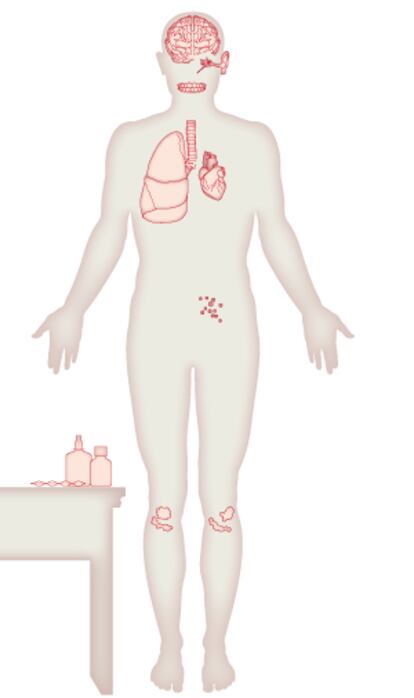Stressed-out Spain
More than five years into the crisis, growing numbers of people are suffering from health problems

Anna Alcaraz was preparing a Spanish omelet when she collapsed. “It was as though somebody had turned a switch off,” says the 56-year-old who after being laid off from her job as a PA decided to open a bar. “I went from working in an office to spending up to 14 hours cooking, and with the added burden of knowing that it was my business… I think it was stress,” she says. Her doctor agrees. Specialists in a range of conditions, backed up by research, show an increase in the number of patients with problems that start out as stress and end up as heart disease, infections, and other illnesses.
Anna suffered what is known as Tumarkin’s otolithic crisis, or a drop attack, which in turn set off other health problems. She has been suffering from Ménière’s disease since 2009, which affects her hearing and balance. “Stress doesn’t give you Ménière’s, but it can worsen the condition of whatever you’re suffering from,” says her doctor, Jordi Coromina, an ear, nose and throat specialist. Her condition was under control until she embarked on her new career; since then she has suffered from constant dizziness, vertigo, and vomiting.
Our hearing, teeth and skin all reflect what’s going on in our brain. “The most-affected diseases we are seeing are related to mental health: anxiety and depression,” says Domingo Orozco of the Spanish Society for Family and Community Medicine. Family physicians are reporting an almost 20-percent increase in people suffering from depression, and an 8.4-percent increase in anxiety in their patients, according to research carried out by the University of the Balearics, which says that a third of doctor visits are the result of fear of unemployment and problems paying the mortgage.
“Migraine, headaches, and even epilepsy can all be brought about by lack of sleep,” says Carlos Tejero of the Spanish Society for Neurology. “A lot of people are not sleeping well. We have had to increase the dosage of many patients’ anti-depressants.”
Family physicians are reporting an almost 20-percent increase in people suffering from depression
José Luis de la Hoz is a dentist, and a specialist in bruxism, involuntary grinding of the teeth during sleep. The condition has become a growing problem as the economic crisis worsens. The usual treatment is a kind of gum shield, but De la Hoz says most of his patients would benefit more from some kind of psychotherapy. “The patient doesn’t have to explain what is going on for you to see that they are going through a bad time,” he says. He also warns that one of the symptoms of depression is letting personal hygiene and basic healthcare slip, meaning that it is often too late by the time somebody goes to their doctor with a problem.
Bruxism is clearly aggravated by stress, and the worse the case, the more stressed sufferers get. The same applies to psoriasis, whereby the immune system speeds up and creates patches of dry, reddish skin. “A healthy person changes their skin around every 28 days, but somebody with psoriasis does so in three days,” says Santiago Alfonso of Acción Psoriasis, a self-help group. Alfonso says there has been a 100-percent increase in the number of psoriasis cases, although many people are reluctant to flag up such problems, fearing the consequences of taking sick time off work.
Many doctors say it is still too early to establish any firm conclusions about the impact of the ongoing economic crisis on Spaniards’ health, and that a range of factors come into play. In 2013, medical journal The Lancet published a review of recent research throughout Europe, noting that there had been a sharp increase in the number of HIV cases in Greece, due to spending cuts that have seen needle exchange programs slashed, along with a 10-percent increase in winter deaths among elderly people unable to pay their fuel bills in Portugal.
A third of doctor visits are the result of fear of unemployment and problems paying the mortgage
But family doctors say they are seeing a pattern. “We see more psychosomatic illnesses, along with others that are clearly rooted in emotional responses to stress, such as problems with the heart, the immune system, hormone imbalances, and obesity and malnutrition,” says Mercedes Abizanda of the Spanish Society of Family Physicians. She adds that the crisis has also made it difficult for many people to pay for medical treatment.
After more than 20 years of success in reducing heart diseases, doctors say that more and more family physicians are referring patients to cardiologists such as José Ramón González-Juanatey, the president of the Spanish Cardiology Society. He says that poverty exposes us to stress-related diseases, as well as obesity, increased salt consumption, and smoking: “When quality of life falls, death rates rise.”
In the end, Anna had to sell the bar. “I’m feeling better thanks to new treatment and because I am more relaxed.” She is now unemployed, but her Ménière’s disease has all but disappeared. “That disease doesn’t kill you, but it really reduces the quality of your life.” Just like the crisis.
Tu suscripción se está usando en otro dispositivo
¿Quieres añadir otro usuario a tu suscripción?
Si continúas leyendo en este dispositivo, no se podrá leer en el otro.
FlechaTu suscripción se está usando en otro dispositivo y solo puedes acceder a EL PAÍS desde un dispositivo a la vez.
Si quieres compartir tu cuenta, cambia tu suscripción a la modalidad Premium, así podrás añadir otro usuario. Cada uno accederá con su propia cuenta de email, lo que os permitirá personalizar vuestra experiencia en EL PAÍS.
¿Tienes una suscripción de empresa? Accede aquí para contratar más cuentas.
En el caso de no saber quién está usando tu cuenta, te recomendamos cambiar tu contraseña aquí.
Si decides continuar compartiendo tu cuenta, este mensaje se mostrará en tu dispositivo y en el de la otra persona que está usando tu cuenta de forma indefinida, afectando a tu experiencia de lectura. Puedes consultar aquí los términos y condiciones de la suscripción digital.









































